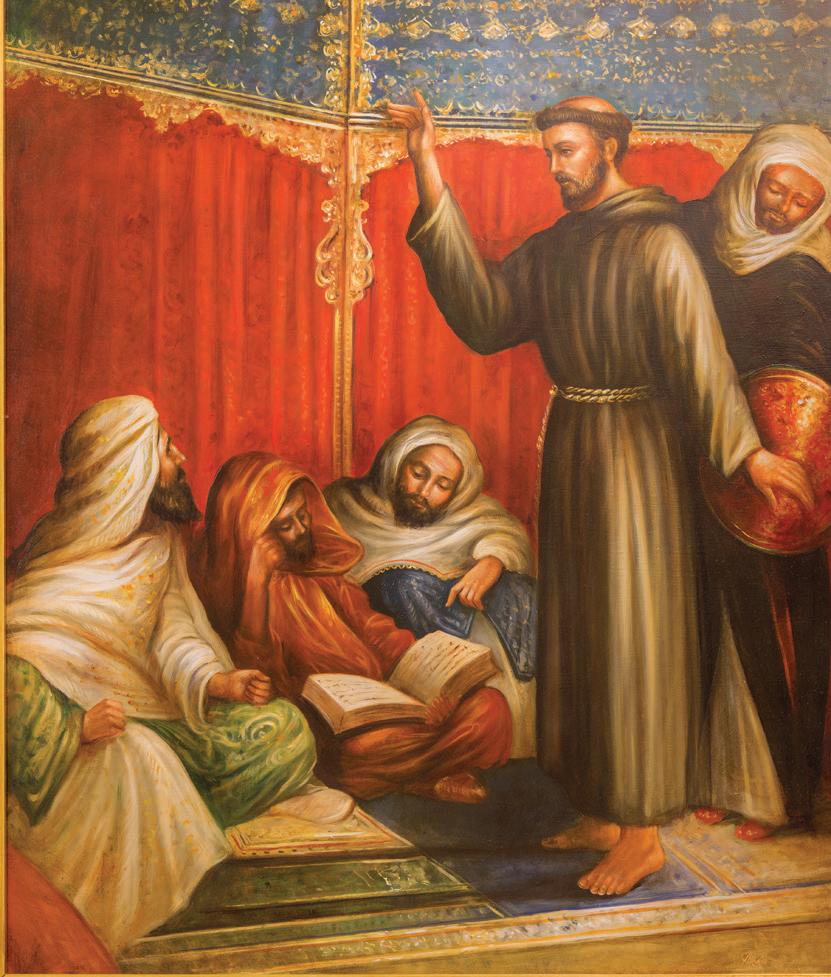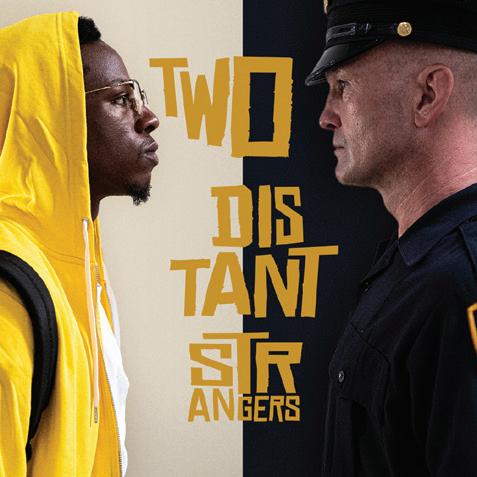
4 minute read
Media Reviews
Interfaith Dialogue and Religion in the Tech World
When St. Francis met Sultan Malik alKamil, a Muslim ruler, in Egypt over 800 years ago, it was during the Fifth Crusade. Interfaith dialogue was still a remote concept, and yet the holy man of Assisi saw the potential for peace through conversation, not the typical course of action: one group dominating another and demanding surrender. Fastforward to today, and there is as much—if not more—of a need for members of different religious backgrounds to connect with each other. And though peace is a very worthy goal, MIT student Marwa Abdulhai points out that interfaith dialogue can help enrich one’s own particular beliefs.
Advertisement
In a TED Talk released earlier this year, Abdulhai, who is studying robotics and artificial intelligence, speaks for a little over 10 minutes about her experience with her school’s interfaith dialogue program, Addir, which means “bridge” in ancient Sumerian. It might seem a bit surprising that a technical, science-heavy institution such as MIT would embrace and encourage a program like Addir, but the school leadership understands the need to prepare its students to thrive in a world where professionals of various religious backgrounds work closely together.
In some scientific circles, speaking of religion is taboo, just as speaking about science is taboo in some religious communities. Abdulhai sees this as a major misstep. “I would like to make the case that avoiding the differences and similarities between ourselves leads, at best, to a brittle and artificial unity and, at worst, to blatant intolerance in our communities,” she says.
In her time with Addir, Abdulhai has met and befriended other students from a wide range of religious (and nonreligious) backgrounds, including Christians, Jews, Hindus, and agnostics. Abdulhai became good friends with a Mormon student named Hope, whom she says “reminds me to pray
my five daily prayers.” Their friendship and conversations about their respective faiths ultimately resulted in both students identifying challenges and pain points within their belief systems, opening the door for spiritual growth. Without interfaith dialogue, both could have easily remained insulated in their unchallenged beliefs, stuck in an immature form of faith.
As Abdulhai points out, the goal of these conversations is not to convert the other person. Rather, they are an exercise in bridgebuilding, a recognition of our shared humanity, and a realization that our collective moral compasses point true north to the God who created us all.
ICONS
Short Film Showcase
Do you love films but can’t always commit to their run times? Netflix has an impressive list of short films to stream for cinephiles with time constraints. Here are six to consider.
IF ANYTHING HAPPENS I LOVE YOU
Aquiet miracle: This animated gem packs quite a bit of story in only 12 minutes. A couple grieves the death of their young daughter, who was killed during a school shooting. Written and directed by Will McCormack and Michael Govier, who won Oscars for their efforts, If Anything Happens I Love You beautifully addresses trauma, grief, and healing—all without a word of dialogue. • TV-PG
ONE LIKE IT
Director Marwan Nabil’s experimental take on bias and cultural stereotypes is worth a look. One Like It follows an Egyptian woman for a day and explores how others view her. To some in her Middle Eastern community, she’s a loose woman; to her mother, she’s a child; to her boyfriend, she’s a harsh authority figure. The film’s core message doesn’t hit as hard as it could, but it’s still an interesting examination of the barriers women face in any culture. • TV-G

TWO DISTANT STRANGERS
Akind of Fruitvale Station/Groundhog Day hybrid, this Oscar-winning film, about a 20-something Black man killed by the same White police officer on an endless time loop, is a unique take on race in America. Even though the narrative sleight of hand is twisty, if not a bit silly, its central message on police brutality—especially in a post-George Floyd America—is deadly serious. • TV-MA
CANVAS
Asweet, nine-minute window into widowhood, Canvas tells the story of an elderly painter mired in grief by the death of his wife. With the help of his daughter and granddaughter, he wills himself to pick up a brush again. While the film paints with predictable hues, it’s nevertheless a measured look at depression and how creativity can heal a battered soul. • TV-G
THE PRESENT
This stunner by director Farah Nabulsi is about a Palestinian father and daughter who must endure a dangerous and humiliating checkpoint along the Israeli-occupied West Bank to buy a gift. Gritty, at times terrifying, and so real it could pass for a documentary, The Present is anchored by Saleh Bakri’s blistering performance as the beleaguered father tasked with a simple errand in a difficult world. Unforgettable. • TV-MA
A LOVE SONG FOR LATASHA
The 1991 killing of 15-year-old Latasha Harlins at the hands of a Los Angeles convenience store owner happened less than two weeks after the beating of Rodney King. Those events—coupled with the acquittal of the police officers responsible for King’s assault—sparked the LA riots the following year. Sophia Nahli Allison’s meditation on Harlins’ brief life is assured and profound. And it is our obligation to remember the name Latasha Harlins. • TV-PG










